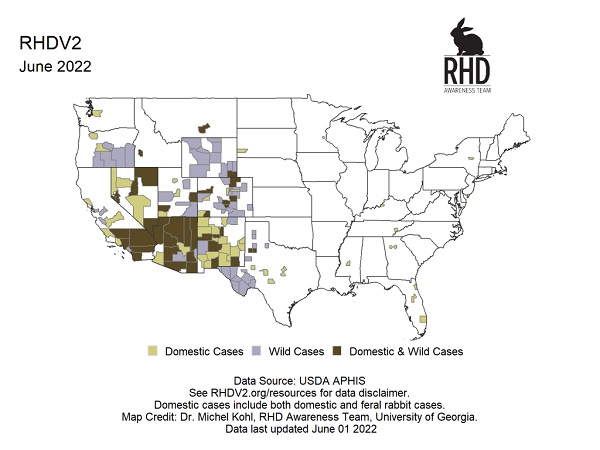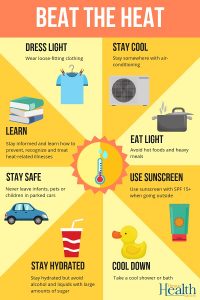RHDV2 confirmed in the death of two domestic rabbits in Lane County
4 min read
from the Oregon Department of Agriculture
On August 1, the Oregon Veterinary Diagnostic Laboratory (VDL) at Oregon State University (OSU) confirmed a domestic rabbit living in Lane County died because of rabbit hemorrhagic disease virus type 2 (RHDV2). The confirmation comes about a week after seven domestic rabbits living in Multnomah County also died because of RHDV2.
The rabbit’s owner reported that the animal became lethargic, refused to eat, then experienced convulsions shortly before suddenly dying on the morning of July 29. Later that day, a second rabbit in the house also died. The owner then submitted one of the animals to OSU for testing. No other rabbits were present in the household.
RHDV2 is a highly contagious virus that can spread quickly among rabbit populations. The virus poses no human health risk and is only known to infect rabbits and hares. It is resistant to extreme temperatures and can survive in the environment for months under certain conditions. Rabbit hemorrhagic disease causes sudden death in rabbits and spreads through direct contact between infected and susceptible live rabbits or exposure to contaminated materials (carcasses, pelts, food, water, and forage, etc.) Birds, rodents, flies, predators, and scavengers can spread the virus via their feet, fur or feathers, or feces without becoming infected themselves. In the Lane County case, wild rabbits are known to reside near the home and the owner’s cat is known to spend time outside as well as spending significant time with the domestic rabbits.
Please report rabbit mortalities to track the virus’s presence and movement.
Call 1-800-347-7028 or visit https://oda.direct/RHD to report domestic rabbits suspected to have died from RHDV2.
To report the death of wild rabbits please contact the Oregon Department of Fish and Wildlife (ODFW) by calling 1-866-968-2600 or email Wildlife.Health@odfw.oregon.gov.
For those raising domestic rabbits (also talk to your veterinarian for advice):
- Minimize exposure to wild rabbits and hares by keeping your rabbits in hutches or cages that are elevated off the ground.
- Keep pet rabbits inside to avoid exposure to environments potentially contaminated by wild/feral rabbits or by people, vehicles, or implements that can spread the disease.
- Do not allow your rabbits to graze or roam in a yard if wild rabbits are present in your area.
- Restrict visitors to your rabbitry and limit the handling of the animals by visitors.
- Avoid transporting or importing domestic rabbits.
- After visiting a show, fair, or meeting where rabbits were commingled, shower and change clothes before handling your rabbits.
- Quarantine new rabbits away from existing ones for 30 days.
- Know the health status of the rabbitry from which you purchase rabbits.
- Keep dogs, coyotes, insects, birds, rodents, and other animals away from your rabbits, as they may carry disease.
- Be aware of the state’s rabbit disease status or country of origin of any equipment or supplies you are purchasing.
- Wash and disinfect hands, clothing, gloves, footwear, cages, and equipment between rabbits from different sources. (RHDV is inactivated by 10% bleach to water solution.)
- Immediately contact ODA (800-347-7028) if you suspect RHD or have sick or freshly dead rabbits.
For hunters:
- If sick or dead rabbits are observed in an area, do not hunt, run dogs, or fly falconry birds in that area. Contact ODFW immediately at 866-968-2600.
- Avoid hunting in areas in states where RHDV-2 outbreaks have been recently documented. Contact the state wildlife agency where you will be hunting for information on where RHDV-2 has been identified.
- After handling wild rabbits, wash hands and change clothing and footwear before handling or caring for domestic rabbits.
- Do not eat, drink, or smoke while handling animals.
- Wear rubber, nitrile, or disposable latex gloves while handling and cleaning the game. Wash hands thoroughly with warm water and soap or sanitizer after handling the game. Disinfect all knives, equipment, and surfaces that were in contact with the game.
- Thoroughly cook all game to an internal temperature of 165°F.
- Do not feed game meat from wildlife that appears sick, are found dead, or test positive for a contagious disease to people or pets, including falconry birds.
- Avoid transporting live wild rabbits for release into training pens or field trials, mainly if sick or dead rabbits have been observed in the area.
Carcass handling
If you find a dead rabbit:
- Wear disposable gloves when handling rabbit carcasses.
- Double bag carcasses and spray outside of the bag with disinfectant.
- Wash hands with soap and warm water after handling carcasses and removing gloves. Dispose of gloves in trash headed to a landfill.





